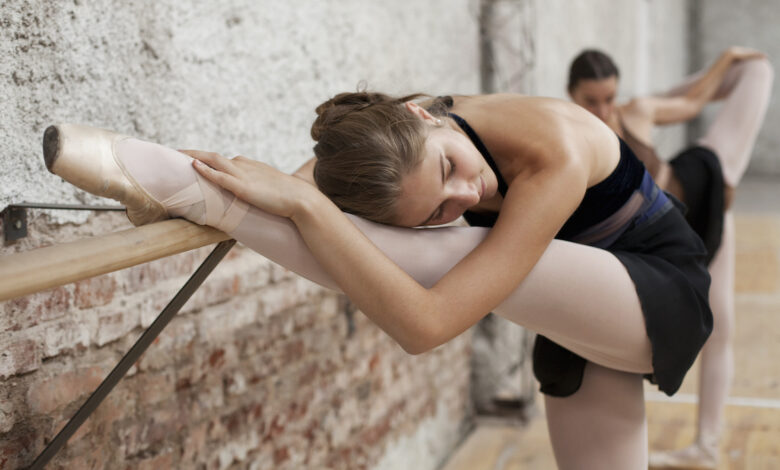The Best Bath Soak for Sore Muscles, Per a Ballerina| Well+Good

For professional ballet dancer Isabella Boylston, sore muscles are par for the course. But the New York City-based ballerina, who has held the highest rank of principal with American Ballet Theatre for nearly a decade, has also perfected her recovery routine—including working with Tenoverten to formulate the ultimate bath soak for her sore muscles.
“I would go to the Tenoverten salon for pedicures,” Boylston says. “Ballerinas have to be careful when we get pedicures because we’ve spent our whole lives basically building up these calluses that we need to dance on pointe, so I’m very particular about where I’ll go, she explains, adding that she’s just as particular about her daily bath. “I take a bath at least once a day, sometimes twice a day, to help me either warm up for or recover from a long day of rehearsals or performances,” says Boylston, who was in the middle of rehearsals for American Ballet Theatre’s annual performances of The Nutcracker in California when we chatted.
That expertise helped Boylston in developing The Recovery Bath Soak ($28) with Tenoverten, an at-home mineral bath soak that includes dancer-favorite ingredients like Epsom salt and arnica extract.
“As well as having the ability to relax muscles and assist with recovery, I wanted something that was good for your skin and non-drying,” Boylston shares. That’s where moisturizing and soothing ingredients like colloidal oatmeal, jojoba seed oil, and aloe vera come in to nourish skin as the soak aids in soothing sore muscles and promoting relaxation—something that Lauren McIntyre ATC, a clinical specialist at NYU Langone’s Harkness Center For Dance Injuries says can be just as beneficial even if you won’t find yourself onstage in back-to-back performances this holiday season.
“Whether you’re stressed with deadlines, trying to get ready for the holidays, dealing with family drama, or picking the kids up from school, having something that helps you unwind at night and get better sleep can be a game-changer this time of year,” says McIntyre, noting that it’s actually more of a placebo effect than any scientifically-backed ingredient that helps with relaxation (more on that later).
Ahead, Boylston shares more about The Tenoverten Recovery Bath Soak, as well as her full post-performance wellness routine that helps her to unwind.
Getting out of performance mode
Performance nights can see Boylston onstage until 10 p.m., which doesn’t leave her with a whole lot of time to rest up before another full day. After using a foam roller to ease post-show soreness, Boylston likes to fully remove her stage makeup at the theater before heading home to finish the rest of her recovery routine.
Some nights, Boylston will occasionally turn to her Normatec Air Compression Pants to boost circulation in her legs (which helps ease muscle soreness), and then it’s time for her bath. “I’ll usually put in a bath oil or even a body oil for more hydration, and then I’m very liberal with The Recovery salts,” she says with a laugh. “I’ll use maybe a quarter of the bag, and then I’ll also have a bucket of ice nearby to create a contrast bath situation for my ankle,” says Boylston, who explains that she’s prone to ankle injuries and finds this helpful for reducing some of the swelling and inflammation.
In addition to Epsom salt, Boylston wanted her soak with Tenoverten to include arnica extract to further boost its recovery-enhancing properties.
“A lot of dancers use arnica cream on injuries to help with inflammation,” she says. McIntyre, whose patients include professional Broadway and company dancers, confirms that Epsom salt and arnica cream are two dancer favorites. “There are no studies that prove any of that is effective in recovery, but that’s not to say that it doesn’t work,” she says, touching on the complexities of these common at-home remedies. “It’s either something that science has not looked at closely in human models or hasn’t been able to prove, but people have been using Epsom salt for hundreds and hundreds of years.”
Another component of the bath soak that was important to Boylston was its scent. “I wanted it to smell really good, so that was where the eucalyptus and peppermint oils came in, to kind of feel like you’re having a spa day,” she says.
McIntyre notes that aromatherapy can help with relaxation and promote a better night’s sleep, something that’s key in helping the body to recover regardless of whether you’re a professional athlete. “Sleep and nutrition are number one in terms of recovery,” she says, adding that finding something to help you “unwind” faster after a long day so that you can get more sleep can also be important.
“The bath ritual is honestly as much about relaxing my mind as it is about my physical body,” says Boylston. “Just having time for myself and allowing my mind to rest is important too.”
Our editors independently select these products. Making a purchase through our links may earn Well+Good a commission.


